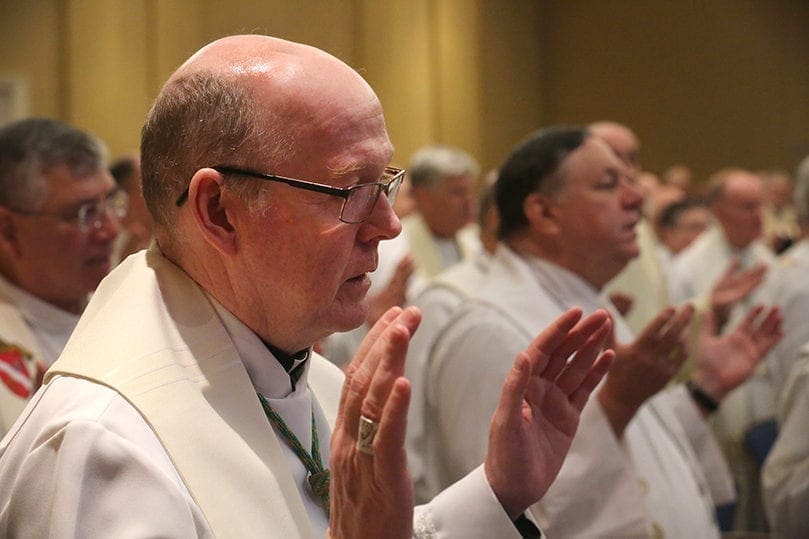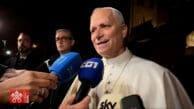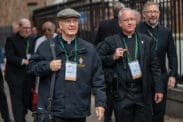 CNS photo/Bob Roller
CNS photo/Bob RollerBaltimore
U.S. bishops examine challenges faced by church, society
By CAROL ZIMMERMANN Catholic News Service | Published November 14, 2019 | En Español
BALTIMORE (CNS)—On the agenda for the U.S. bishops’ Nov. 11-13 meeting in Baltimore were elections and discussions of key challenges in the church and the nation. Unlike recent previous meetings, their response to the clergy abuse crisis was mentioned but was not the primary focus.
On the second day of the meeting, Nov. 12, the bishops elected Archbishop Jose H. Gomez of Los Angeles to a three-year term as president of the U.S. Conference of Catholic Bishops and Archbishop Allen H. Vigneron of Detroit as conference vice president.
Archbishop Gomez, the first Latino to be elected to this role, was chosen with 176 votes from a slate of 10 nominees. He has been USCCB vice president for the past three years and his new role begins at the end of the Baltimore gathering.
Among the other votes Nov. 12, the vote with the most discussion was about new materials to complement “Forming Consciences for Faithful Citizenship,” their long-standing guide to help Catholics form their consciences in public life, including voting. The bishops voted to approve the additions, including the addition that abortion is the preeminent social issue of our time.
On the first day of the meeting Nov. 11, the bishops raised pressing issues that included the priesthood shortage, gun violence, young people leaving the church and the need to provide support services for pregnant women.
Archbishop Christophe Pierre, papal nuncio to the United States, mentioned some of these challenges in his opening remarks, along with the need to welcome migrants and fight racism. He also urged the bishops not just to focus on the challenges before them but to consider how they could further develop collegiality and collaboration with one another.
In his final address as president of the U.S. Conference of Catholic Bishops, Cardinal Daniel N. DiNardo of Galveston-Houston told his fellow bishops that it has been “an honor to serve you, even in the difficult times.”
The 70-year-old prelate thanked the bishops, whom he called brothers, for the past three years and was thanked by them in return when the group gave him a standing ovation at the end of his nine-minute presentation.
“Let’s begin anew,” he said, at the close of his address, veering away from prepared remarks, and quoting St. Augustine.
The cardinal, who suffered a mild stroke earlier this year, did not elaborate on specifics of the abuse crisis in the church, particularly highlighted this past year, but spoke of the bishops’ continued work of transparency related to dealing with the crisis. He said the abuse measures adopted by U.S. bishops at their meeting last June are “only a beginning. More needs to be done.”
At the start of the meeting, Bishop Earl A. Boyea of Lansing, Michigan, asked for an update on the Vatican’s report on the McCarrick situation, which many of the bishops, by voice vote, also said they wanted to hear.
In a brief presentation, Boston Cardinal Sean P. O’Malley told the bishops the Vatican has not yet published a report about its investigation of now-defrocked former U.S. Cardinal Theodore E. McCarrick, but a report could be ready by Christmas, or in the new year.
He said he and other bishops at the Vatican for their recent “ad limina” visit said they were “anxious to receive the Holy See’s explanation of this tragic situation, how he could become an archbishop and cardinal, who knew what and when.” He also stressed that the “long wait has resulted in great frustration on the part of bishops and our people and indeed a very harsh and even cynical interpretation of the seeming silence.”
Priorities for the years ahead
In another vote, the bishops voted overwhelmingly on a revised set of strategic priorities to take them into the next decade. They also discussed upcoming votes during their gathering, such as news materials to complement “Forming Consciences for Faithful Citizenship,” their long-standing guide to help Catholics form their consciences in public life, including voting.
Retired Army Col. Anita Raines, who chairs the National Advisory Council, said in a report to the bishops that the group supported the prelates’ effort to promulgate its “Faithful Citizenship” document and supplemental materials.
To help ensure the document’s wide distribution to parishes and individuals, the council recommended the USCCB implement “a strong communications strategy fully leveraging social media.”
This wasn’t the only mention of social media during the start of the meeting.
Auxiliary Bishop Robert E. Barron of Los Angeles urged the bishops to promote social media in their dioceses as one way to link young people with the church. He said the church is losing young people in greater numbers and must face the challenges of how to get the religiously unaffiliated or “nones,” particularly young people, back to the Catholic Church.
The bishop presented a three-minute video on the issue and spoke of his concerns and ideas for bringing young people back to church which involved: not dumbing down the faith and involving young people in the social justice aspects of the church.
His presentation led to discussion that lasted for more than an hour with bishops from across the country agreeing that this issue is of great concern and sharing other ideas to bring young people back which primarily involved catechism but also an increased devotion to Mary.
Bishop Barron, chairman of the bishops’ Committee on Evangelization and Catechesis, who is known for his website, “Word on Fire,” and for hosting the documentary series “Catholicism,” initially brought up this topic during the bishops’ spring meeting. He said at the time, and reiterated Nov. 11, that this topic needs to be a priority for the church today.
The bishops also heard about societal issues such as gun violence and Bishop Frank J. Dewane of Venice, Florida, said Catholic clergy and lay leaders can play a role in bringing together people along the rural-urban divide to build understanding of the need for sensible policies that can end the scourge of gun violence.
The bishop, who is chairman of the U.S. bishops’ Committee on Domestic Justice and Human Development, outlined the USCCB’s long-held stance of the need for “common sense” legislation that governs the availability of guns. But he also said it was time for people to come together so that there is greater understanding of how gun violence affects urban communities in particular.
He told Catholic News Service that the USCCB’s work on the legislative front was important, but that a pastoral response to gun violence was needed.
“It’s time for a different approach,” he said.
In a new approach for the bishops’ pro-life efforts, Archbishop Joseph F. Naumann of Kansas City, Kansas, invited his fellow bishops to devote a year of service to pregnant women starting next March.
He said Catholic parishes can be one of the first places a woman facing an unexpected or challenging pregnancy can turn to for assistance rather than think of seeking an abortion and they could offer a variety of support services to women who may be thinking about whether to carry their child to term.
The bishops also heard about plans to revise the U.S. Conference of Catholic Bishops’ existing Program of Priestly Formation for U.S. dioceses.
In his homily at the Nov. 11 Mass in the hotel ballroom, Cardinal DiNardo stressed that St. Martin of Tours, whose feast was celebrated that day, offered them a fitting example.
He said little is known about what the saint wrote in the late 300s but plenty is known about what he did: “reconciling the Christian community and reconciling the clergy, even then.”
“Brothers, we have someone to imitate tonight,” he told them.
Contributing to this report was Rhina Guidos, Mark Pattison and Dennis Sadowski.

